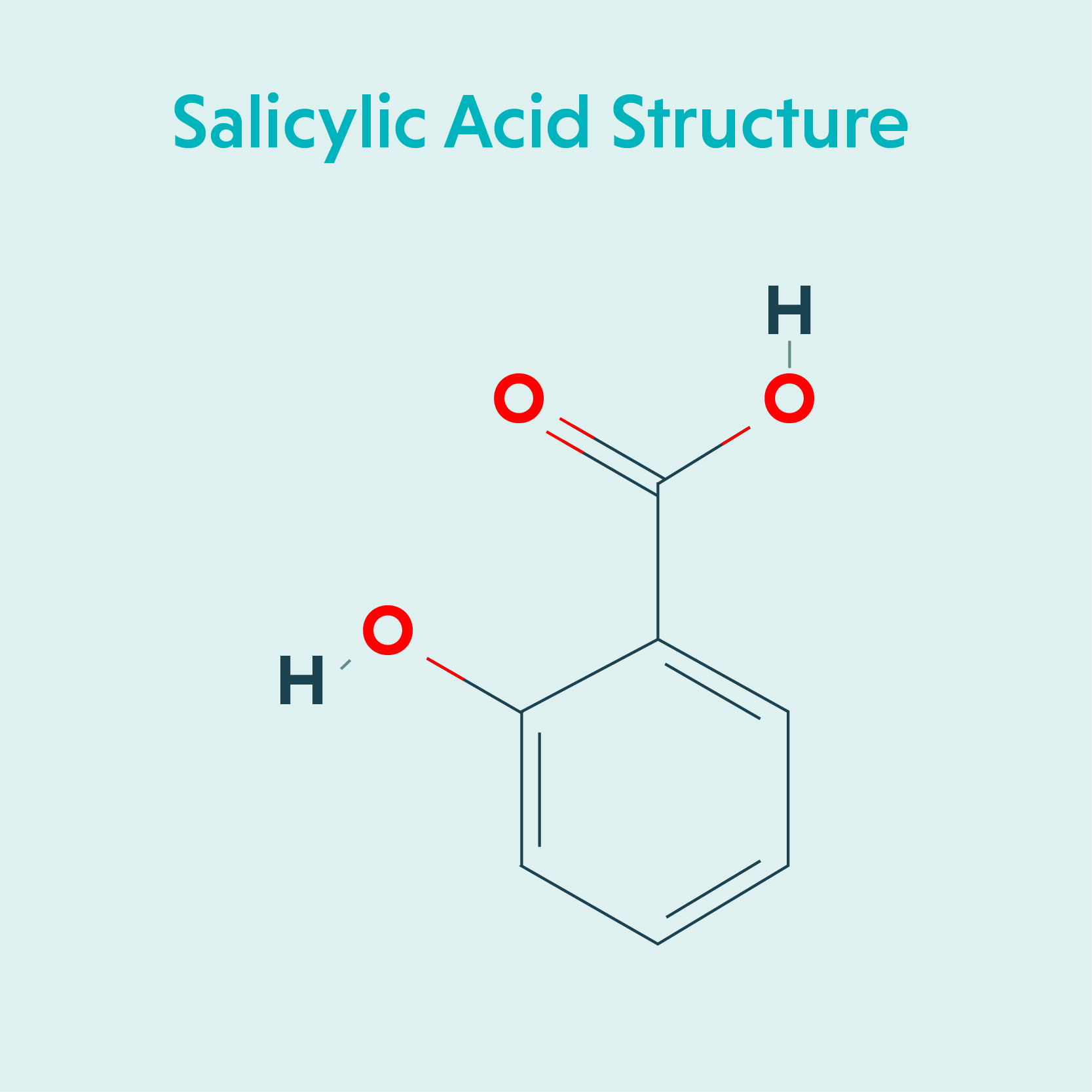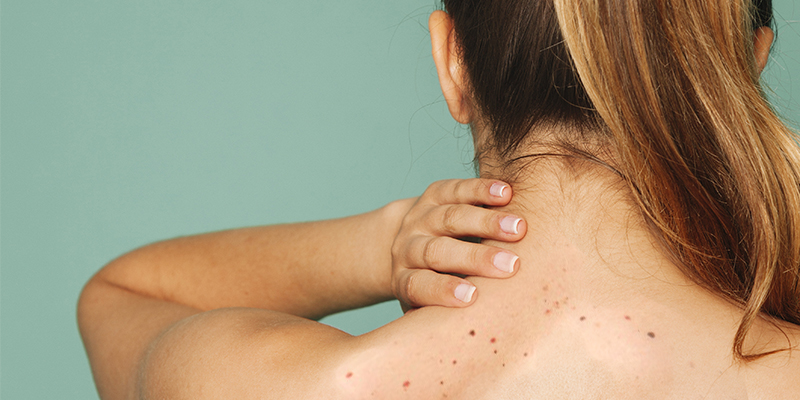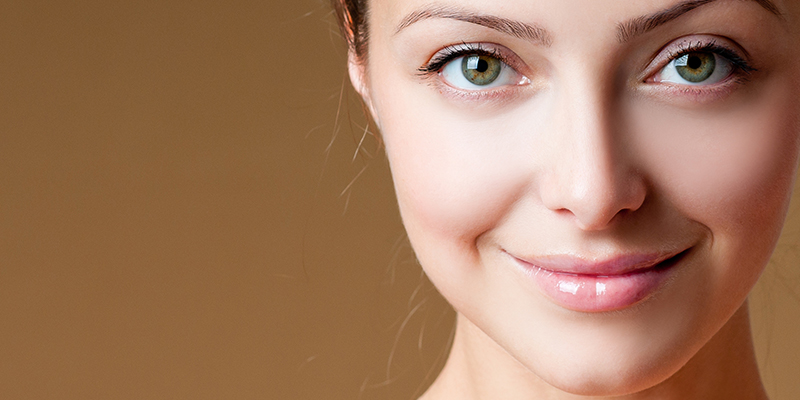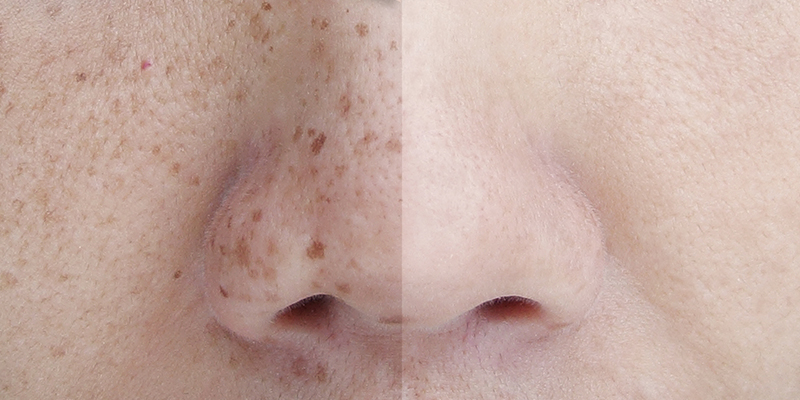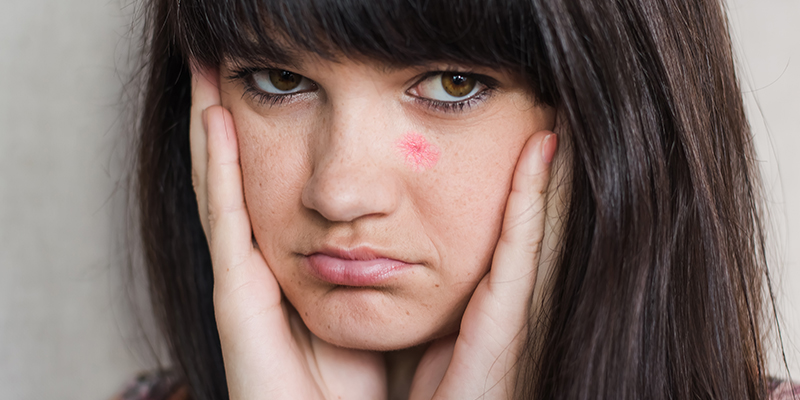In This Article
Body Acne: Causes, Remedies, and Dermatological Solutions for Clearer Skin
Acne is not just a common concern that affects the face but also other body areas. Body acne, like facial acne, occurs when the hair follicles are clogged with oil and dead skin cells. This leads to inflammation and infection. Generally, teenagers are more susceptible to acne, but individuals with oily skin can develop acne at any age. Timely intervention and effective treatment can, to a great extent, manage body acne. This article gives you valuable information about the causes and types of acne, preventive measures, and the various dermatological body acne treatment procedures to control acne breakouts.
In This Article
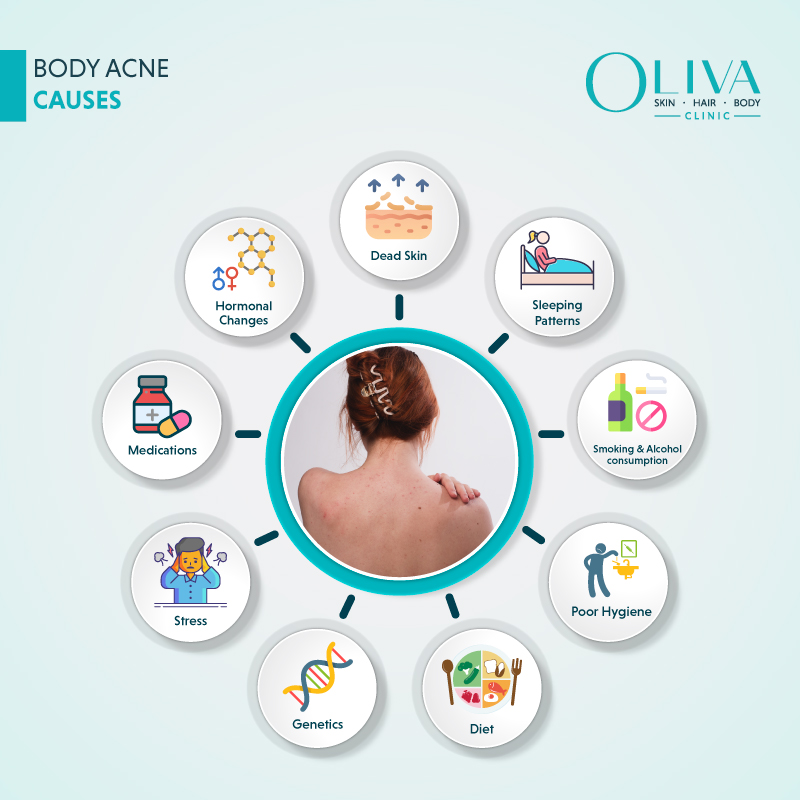
What Is Body Acne?
As previously mentioned, back body acne and facial acne are not very different, and it is common owing to the concentration of oil glands in this area. Body acne causes are the same as facial acne and most often, people who have facial acne tend to have acne on the shoulders and the back as well. While people assume that poor hygiene is the leading cause of this skin condition, other factors like harsh soaps and chemicals, rough scrubbing, tight clothes, hormonal changes, etc., can also cause it.
Detailed Analysis Of Body Acne Causes
-
Overactive Oil Glands:
Skin is made of sebaceous glands that produce oil(sebum). This oil protects the skin from environmental damage. [1] When these glands are overactive, they produce excess sebum that clogs pores and builds up dead cells, bacteria, and dirt. This clogging results in the formation of cysts or pimples, leading to body acne. Areas with higher gland activity, i.e., the chest and back, are more susceptible to body acne.
-
Excess Dead Skin Cells:
Sebum mixes with excess dead skin cells and plugs the hair follicles. [2] Clogged pores create a perfect environment for the bacteria to thrive, resulting in inflammation and acne breakouts. Acne can appear on any part of the body where excess dead skin cells accumulate and combine with oil.
-
Hormonal Changes:
Body acne causes include hormonal changes at various stages of life. During puberty, androgens activate sebum production in both men and women, which results in acne formation. [3] As age advances, oestrogen levels in women decline, and testosterone levels in men increase. This enhances oil production, which results in clogged pores and acne breakouts. Hormonal changes in women in midlife can also cause body acne.
-
Medications:
Medications can react in various ways and contribute to body acne. [4] They may disturb hormonal levels and activate sebaceous glands, leading to clogged pores. They can also cause allergic reactions that manifest as acne or disturb the gut flora, further affecting the skin. Some common medications that trigger body acne are lithium, corticosteroids, anabolic steroids and contraceptives that alter hormonal levels.
-
Stress:
Stress does not cause body acne but can activate or aggravate it by disturbing hormonal levels. [5] When stressed, your body releases cortisol, the hormone responsible for oil production. Excess oil can clog pores, leading to body acne. Also, stress can promote inflammation and affect the skin’s immune system, making it difficult for your body to fight acne-causing bacteria.
-
Genetics:
Genetics plays a significant role in body acne causes. [6] The skin type, oil production, and hormonal levels are all influenced by genetics. If there is a family history of body acne, the tendency to develop similar skin issues is higher. You may be more prone to overproducing dead skin cells and shedding them in a way that clogs pores.
-
Diet:
Research indicates that diet can significantly impact body acne. [7] High glycaemic foods like white rice, pasta, baked foods, etc., spike blood sugar levels in your body. This causes the release of insulin-like growth factor 1 (IGF1), a hormone that stimulates excess oil production, enhancing the risk of body acne and inflammation.
-
Poor Hygiene:
The build-up of sweat, dirt, and dead skin cells on the skin can result from poor hygiene. [8] Bad bacteria thrive under such conditions resulting in an imbalance of good and bad bacteria, triggering acne all over the body.
-
Smoking And Alcohol consumption:
Smoking and alcohol can trigger inflammation, affecting skin health by causing acne all over the body. [9] Smoking reduces blood flow to the skin, which weakens the skin’s healing ability. Meanwhile, alcohol dehydrates the skin and causes hormonal imbalance, both contributing to the formation of painful body acne.
-
Sleeping Patterns:
Poor sleep pattern deprives your body of the required amount of rest, increases stress and can cause hormonal imbalances. [10] It also elevates cortisol production, further increasing oil production in the skin. Insufficient rest can also weaken your body’s ability to heal and regenerate skin, making you more vulnerable to body acne.
-
Menstrual Cycles:
Hormonal changes like reduced oestrogen levels and increased progesterone levels lead to hormonal imbalances during menstrual cycles. This increases the oil production in the skin leading to clogged pores and body acne breakouts. [11]
Types And Severity of Body Acne
Body acne can manifest in different forms, categorised as mild, moderate, and severe and the body acne treatment is based on the severity.
-
Acne Mechanica:
The combination of sweat, heat, and pressure on the skin due to sports gear and tight clothing inflame the follicles. You should understand that any unnatural pressure on the skin can cause the formation of acne in the whole body.
-
Acne Cosmetica:
Acne cosmetica results from the use of comedogenic ingredients. They clog the hair follicles and pores, contributing to body acne.
-
Whiteheads: (Closed Comedones)
Whiteheads or closed comedones form when excessive oil and skin debris clog the pores. They are non-inflamed blemishes that are mild and often managed with over-the-counter prescriptions.
-
Blackheads: (Open Comedones)
Blackheads, which often people understand as black acne on the body, also result from oil and dead skin cells clogging the hair follicles. [12]
-
Papules:
Papules are small red acne on body. They appear as raised inflamed bumps without pus. These occur when hair follicles are plugged. These are mild acne and can appear in various colours other than red.
-
Pustules:
Pustules are small swollen sores filled with pus that appear on the skin and look like blisters. Infection, adverse reactions to medicines, etc. are the main causes of this skin condition.
-
Nodules:
Nodules are lumps beneath the skin due to the growth of abnormal tissues. They are visible hard lumps under the skin. The armpits, groin, neck, head, and lungs are the areas generally affected.
-
Cysts:
A cyst is a pocket of tissue filled with fluid, air or other substances that can appear on any body part. It resembles a blister and will need treatment if problematic.
Long-Term Management And Prevention:
Body acne treatment at home is possible if it is mild. However, the typical acne treatments are:
-
Use Gentle Cleansers:
When home remedies for body acne fail, using gentle cleansers can help. They remove excess oil and impurities that clog the pores. Dermatologists recommend the use of non-comedogenic, non-irritating, and non-allergic cleansers for better results.
-
Exfoliate:
Body acne remedies for whiteheads, blackheads, etc, include exfoliation, which removes dead skin cells and excess oil, unclogs the pores, and clears your skin. But consult a dermatologist for an exfoliation routine and the best products and treatments that work for your skin.
-
Moisturise:
The body produces more oil when the skin is dehydrated. This clogs the hair follicles and results in body acne. Using a moisturiser keeps your skin hydrated and oil production under control.
-
Avoid Friction:
Avoid wearing tight-fitting, rough clothing or accessories. If your skin is constantly exposed to pressure, consider small changes to give your skin a break. Sweat and friction cause clogged pores resulting in breakouts.
-
Reduce The Usage Of Cosmetic Products:
Avoiding unsuitable cosmetic products can prevent clogging of pores, irritation, and allergic reactions. Individuals with sensitive skin are more prone to acne when they use cosmetics containing oils and chemicals.
-
Be Careful With Over-the-Counter Products:
Gentle scrubs and non-comedogenic creams can help as they do not clog pores. Mild inflammatory body acne can be treated with body washes that contain salicylic acid and benzoyl peroxide. Choose with care.
-
Use Prescription Medications After Consulting A Dermatologist:
Prescription medications target the cause of acne. In case of severity, dermatologists recommend oral medications. Antibiotics control inflammation, and retinoids unclog pores.
-
Manage Stress:
Stress triggers the release of the hormone cortisol, which stimulates oil production and inflammation. Stress management controls acne breakouts, and the result is clearer skin.
-
Make Lifestyle Changes (where necessary):
Lifestyle changes like a healthy diet, showering after activities that cause sweat, avoiding tobacco and alcohol, wearing loose and breathable clothes, using gentle cleansers and body washes, etc., can prevent clogging of pores and arrest acne breakouts.
Advanced Dermatological Procedures:
There are not many natural ways to get rid of body acne, but you can manage the condition and also seek the help of a dermatologist in case of persistent and severe body acne. Some advanced dermatological procedures to manage body acne include:
-
Oral And Topical Medications:
Dermatologists generally suggest oral and topical medications to treat body acne. They prescribe antibiotics for acne, which target the bacteria thriving on the skin and reduce inflammation. This relieves swelling and minimises the chances of scarring. [13]
-
Chemical Peels:
Chemical peels are effective, scientifically proven solutions compared to natural remedies for body acne that do not often give the desired results. They remove skin cells from the epidermis, dermis, or even deeper layers of the skin, depending on the severity of the acne. They are effective in reducing both active acne and the scars that appear after acne heals. [14]
-
Comedone Extraction:
Comedone extraction involves physically removing hair follicle blockages, where the affected skin shows instant improvement. Make sure you do this under the supervision of a dermatologist. [15]
-
Laser Toning:
Laser Toning is an advanced skin treatment that involves the use of laser energy to target melanin deposits and break them down. The body naturally eliminates them. This treatment works for the pigmentation that results from acne, where the improved collagen production reduces its appearance. [16]
Myths And Misconceptions
Myth 1: Only Teenagers Get Body Acne
Reality: Acne can affect people of all ages, not just teenagers. Hormonal changes, stress, and lifestyle factors have a major role to play here.
Myth 2: Sun exposure helps clear acne.
Reality: While sunlight may temporarily dry out pimples, too much exposure can worsen acne by irritating the skin.
Myth 3: Popping Pimples Will Make Them Go Away Faster
Reality: Popping acne can actually make it worse. It can lead to the spread of infection and eventually even scarring.
When To Seek Professional Help
If you are dealing with persistent red acne on body or deep black acne on body, it may be time to seek professional help. While mild acne can often be managed with over-the-counter treatments, severe or recurring breakouts might need specialised care.
It is always best to consult a dermatologist when you see pimples. [17] A dermatologist can assess your condition and suggest the appropriate treatments that suit your skin type and acne severity.
Takeaway
Body acne treatments are subjective and it is always best to consult a dermatologist who can assess the severity and recommend the best treatment plan. While basic skincare can help, knowing how to get rid of body acne effectively often involves identifying the root cause, followed by the best treatment and consistent skincare routine. For severe cases, professional treatments under expert dermatologists work better.
Frequently Asked Questions
A dermatologist can help identify the cause of your acne. We recommend that you consult an experienced dermatologist if the spread and severity of your acne are high.
If you want to remove painful body acne, you must maintain proper hygiene, use gentle cleansers, and exfoliate regularly. We suggest that you don’t try body acne treatments at home. Instead, meet a dermatologist who can give you a lasting solution to manage acne.
Often, zinc and vitamin D deficiencies are common body acne causes that go undetected for a long time.
Sugary, oily, processed and dairy foods often become the trigger or the main causes of body acne in many people.
Yes, with proper skin care and treatment, including natural remedies for body acne, it is possible to make body acne disappear.
The best solutions to treat acne in body parts often include ingredients like salicylic acid and benzoyl peroxide. In addition to that, exfoliating scrubs are also effective.
To stop the spread of acne all over body, you must wear breathable clothing and avoid excessive sweating. It is also important to maintain a regular skincare routine.
To get rid of body acne, you can use several approaches, including home remedies for body acne, as well as clinical procedures and treatment options. It is advisable to consult a dermatologist to understand what will work best for you.
You can manage body acne by maintaining hygiene, using medicated body washes, gentle exfoliants and acne-friendly skincare products. You will also have to avoid oily products. A healthy diet and dermatologist-recommended body acne treatment options can help cure body acne.
If you want quick body acne remedies that give overnight results, try spot treatments with salicylic acid or benzoyl peroxide. They act fast, but their effectiveness varies.
Some of the best natural ways to get rid of body acne include applying tea tree oil, using aloe vera gel, and maintaining proper hygiene. But the results vary for everyone, so be cautious.
Pimples develop when hair follicles get clogged with oil, bacteria, or dead skin cells.


